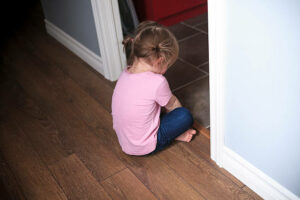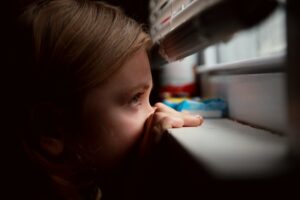The NSPCC is calling on the government to invest in early years’ services to ensure we are “keeping the youngest children safe from harm”.
 The national children’s charity has spoken out after data showed that almost 4 in 10 of its Helpline referrals involved children aged 5 and under.
The national children’s charity has spoken out after data showed that almost 4 in 10 of its Helpline referrals involved children aged 5 and under.
The NSPCC said that their records showed that 40% of all referrals made by their Helpline to local services, including the police and children’s social care teams, related to very young children and babies.
This equated to a total of 11,465 children aged 5 and under – or 30 babies and young children each day – being referred to services because of abuse and neglect.
Early years children vulnerable to serious abuse and neglect
 NSPCC records reveal that the most common concern about these very young children was neglect.
NSPCC records reveal that the most common concern about these very young children was neglect.
Last year, they referred over 5,000 children aged 5 and under because their basic needs were not being met and their safety was at risk. These neglect concerns included worries related to parental alcohol and drug misuse and young children being left alone or unsupervised.
Physical abuse was another major concern, coming just under neglect.
NSPCC records show that 2,344 children aged 5 and under were referred to local services due to physical abuse last year. Concerns related to children being smacked, hit, punched, kicked, physically punished and obtaining non-accidental injuries.
Children aged 5 and under are particularly vulnerable to serious cases of abuse and neglect, with the NSPCC highlighting the fact that, before reaching school age, they are the least likely to be visible to professionals who have a role in keeping them safe. They are also “completely reliant on their parents and carers” for their survival and are less able to speak up and ask for help.
Government data also reinforces the vulnerability of children aged 5 and under, revealing that almost 200 children aged 5 and under died or were seriously harmed in England in the past year. This equates to almost half (48%) of all serious cases of child abuse and neglect.
Early years services must be well resourced
 The NSPCC are now calling on the government to ensure that early years services including health visitors and statutory safeguarding partners are well funded, well resourced and given all the tools they need to work effectively and protect the youngest and most vulnerable children in our society.
The NSPCC are now calling on the government to ensure that early years services including health visitors and statutory safeguarding partners are well funded, well resourced and given all the tools they need to work effectively and protect the youngest and most vulnerable children in our society.
Vicky Nevin, Policy Manager at the NSPCC, said:
“Babies and young children are completely reliant on their parents and carers for their healthy development and survival. Compared to an older children, a baby or toddler is less able to ask for help when they are being abused or neglected.
“It is vital that the police, the NHS, children’s services and other professionals are given the resources they need to proactively work together on keeping the youngest children safe from harm.
“Every family should have access to quality early years services that support the nurturing relationships young children need. These services should be delivered locally so that there is a community of support and problems are not left to escalate.”
She added that government plans to remove barriers to opportunity and level up society “must start at the beginning – by protecting the youngest children, so that they can grow into healthy and happy adults.”
Reporting concerns for a child’s welfare
 Anyone with any concerns about a child’s safety or welfare can contact the NSPCC Helpline. The charity urges people to make contact “even if you’re unsure,” and to trust their instincts.
Anyone with any concerns about a child’s safety or welfare can contact the NSPCC Helpline. The charity urges people to make contact “even if you’re unsure,” and to trust their instincts.
If you are worried that a child may be in immediate danger, you should call the police on 999 straightaway.
The NSPCC provides more advice and what to do if you suspect child abuse and how you can help to keep a child safe on their website. They also provide a range of advice and support for parents, on issues such as babies and sleep, crying, bonding with babies and managing family life.
Training to safeguard children in early years
First Response Training (FRT) is a leading, national training provider delivering a wide and diverse range of training courses. They can provide training in the fields of health and safety, first aid, fire safety, food safety, safeguarding, mental health, health and social care and other specialist subjects.
 FRT work with hundreds of early years services, schools and other childcare and support groups across the UK, providing them with high quality training to meet EYFS and Ofsted guidelines.
FRT work with hundreds of early years services, schools and other childcare and support groups across the UK, providing them with high quality training to meet EYFS and Ofsted guidelines.
Their training courses for early years include Paediatric First Aid, Safeguarding Children and Youth Mental Health First Aid. They also deliver courses in topics such as Understanding Mental Health and Anxiety Awareness.
A trainer from FRT says:
“The early years are an incredibly important time, building the foundation for a child’s future. It’s important that parents, babies and children have appropriate support during these years to ensure that every child gets the best start possible.
“It is always deeply saddening to hear of any child being mistreated, particularly by those who are supposed to care for them.
“We know from the many organisations that we work with, that those who provide frontline care and support for babies, children and young people are committed to keeping them safe and do their utmost to achieve this. Often, though, they face many challenges and significant pressures.
“It’s vital that anyone who works with children and young people completes Safeguarding training so that they are aware of the signs of child cruelty and neglect and know the correct action to take if they suspect a child is at risk.”
For more information about the training that FRT can provide, please call them today on freephone 0800 310 2300 or send an e-mail to info@firstresponsetraining.com.
